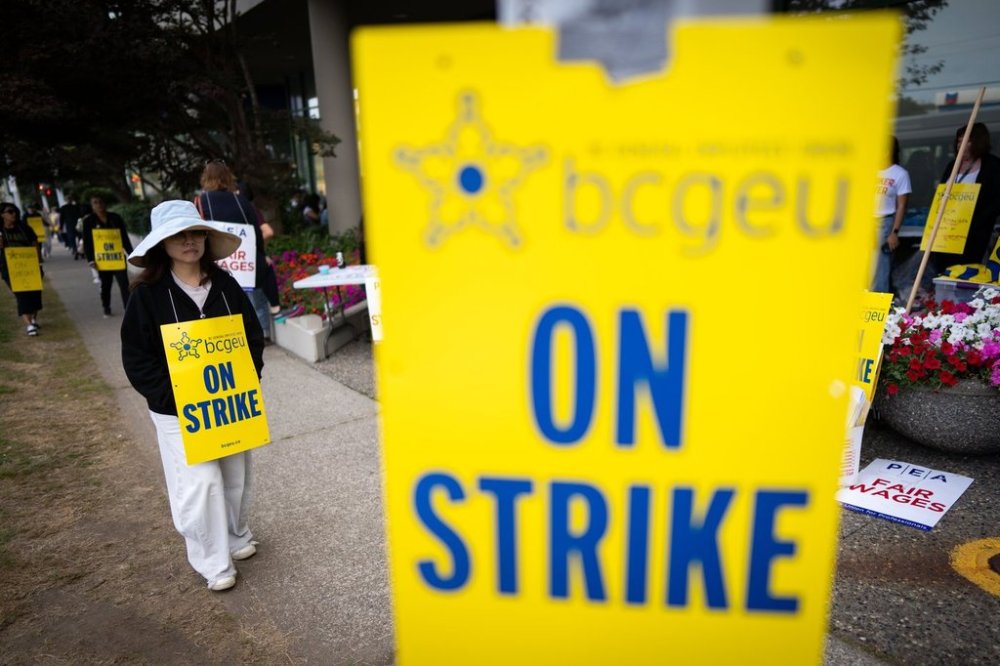All B.C. government liquor, cannabis stores now behind workers’ pickets in escalation
Advertisement
Read this article for free:
or
Already have an account? Log in here »
To continue reading, please subscribe:
Monthly Digital Subscription
$1 per week for 24 weeks*
- Enjoy unlimited reading on winnipegfreepress.com
- Read the E-Edition, our digital replica newspaper
- Access News Break, our award-winning app
- Play interactive puzzles
*Billed as $4.00 plus GST every four weeks. After 24 weeks, price increases to the regular rate of $19.00 plus GST every four weeks. Offer available to new and qualified returning subscribers only. Cancel any time.
Monthly Digital Subscription
$4.75/week*
- Enjoy unlimited reading on winnipegfreepress.com
- Read the E-Edition, our digital replica newspaper
- Access News Break, our award-winning app
- Play interactive puzzles
*Billed as $19 plus GST every four weeks. Cancel any time.
To continue reading, please subscribe:
Add Free Press access to your Brandon Sun subscription for only an additional
$1 for the first 4 weeks*
*Your next subscription payment will increase by $1.00 and you will be charged $16.99 plus GST for four weeks. After four weeks, your payment will increase to $23.99 plus GST every four weeks.
Read unlimited articles for free today:
or
Already have an account? Log in here »
Job action by British Columbia public service workers is putting pressure on craft brewers, with the head of one industry group saying major players are facing a cash flow crunch, while smaller breweries are contending with a boon in demand.
Ken Beattie, executive director of the BC Craft Brewers Guild, said the escalation of job action by the BC General Employees’ Union to include all government-run liquor stores in the province is affecting brewers in different ways depending on their size.
“Our biggest members … they’re getting devastated,” he said in an interview Wednesday. “It’s not good for them at all.”

Smaller breweries that aren’t reliant on the province’s distribution system, however, can sell and deliver directly to private retailers and bars and restaurants, so they’re grappling with the increase in demand, Beattie said.
“They’re not really set up for a huge increase in requests because they only have a certain amount of people working and … delivering,” he said.
Beattie’s comments come after picket lines went up Wednesday in front of all remaining government-run liquor and cannabis stores in the province.
He said government liquor warehouses have been behind picket lines for a while, and with stores now closed, larger breweries have weeks’ worth of inventory that’s not moving, heavily impacting sales and resulting in some employee layoffs.
The liquor distribution system is efficient and low cost when it’s functioning, Beattie said, but it’s “strangling” the larger breweries as their best-selling products are sitting idle and potentially expiring during the labour dispute.
“We respect the fact that people can strike and ask for a better wage, but the downstream effect of this is catastrophic to a number of breweries,” he said.
“Our ask is please get back to the table.”
The escalation by the union also includes all Service BC workers, raising the total number of members participating in job action to almost 25,000.
Union president Paul Finch said in a statement that he regrets the impact of the pickets on local communities and members are not taking escalation lightly.
But he said the union is “left with no alternative” in its push for higher wages.
“The government has a choice: they can sit down and bargain with us — or they can continue to let this disruption escalate,” Finch said.
“We’re ready to talk. We’ve been ready. The ball is in their court.”
There are 34,000 members in the bargaining unit, some of whom are considered essential workers.
Private liquor and cannabis stores in B.C. remain open, but they are supplied by provincial government distribution warehouses that are behind picket lines.
Restaurants Canada said in a statement Wednesday that the strike, which is dragging into its sixth week, means the B.C. government should allow restaurants to source liquor from private stores.
The national industry association said restaurants rely heavily on alcohol sales for profitability.
“If the B.C. government can’t find a solution to allow food service businesses to purchase alcohol, either from B.C. Liquor or from private liquor stores, it needs to consider back to work legislation,” the statement said.
Service BC workers provide services related to drivers licensing, income and disability assistance, hunting and fishing licenses, identification verification and payments for B.C. traffic tickets, as well as student loans and court fines.
The union said Wednesday that a total of 431 provincial government work sites were behind picket lines.
Finance Minister Brenda Bailey, who has been speaking for the province in the dispute, has repeatedly said the government wants to balance a fair deal with fiscal constraints.
“Right now, we’re really focused on getting back to the table. That’s the most important thing,” she told reporters at the legislature on Wednesday. “These negotiations need to get back on track, and we’re looking forward to that happening.”
She said people still have access to “fabulous wines” in B.C. and can buy directly from craft breweries in advance of the Thanksgiving long weekend with government liquor stores now closed by the strike.
Finch said that while the union wants an agreement that would help workers deal with rising living costs and inflation, that is not the only goal.
“This is not just about wages — this is about investing in the services people across this province depend on,” he said.
This report by The Canadian Press was first published Oct. 8, 2025.

